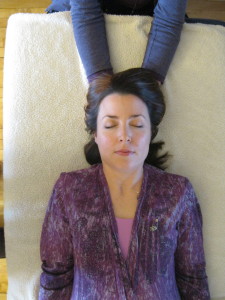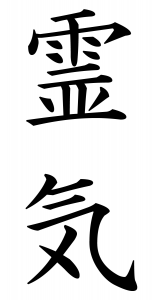 People come to Reiki sessions for a variety of reasons. Some people come with a strong belief in the practice and no doubt in their minds. However, others arrive wondering why they’re there and how effective Reiki will be for their particular ailment. For those who are doubting the practice, I say to them that people find Reiki very relaxing. When the body is relaxed it heals faster. When the mind is relaxed, it thinks more clearly and creatively. When the spirit is relaxed, it makes stronger connections to others.
People come to Reiki sessions for a variety of reasons. Some people come with a strong belief in the practice and no doubt in their minds. However, others arrive wondering why they’re there and how effective Reiki will be for their particular ailment. For those who are doubting the practice, I say to them that people find Reiki very relaxing. When the body is relaxed it heals faster. When the mind is relaxed, it thinks more clearly and creatively. When the spirit is relaxed, it makes stronger connections to others.
If you’re looking for quantifiable evidence about the efficacy of Reiki, I don’t have that information. However, I do have years of experience in practicing this hands-on healing modality on myself and others. From my experience as both a recipient and a practitioner, I know Reiki works. To demonstrate this, I’ll share some anecdotal evidence through the stories below. (All names have been changed to maintain anonymity.)
—————–
Carole, a breast cancer patient, arrived for a Reiki session with a cold. She had never had Reiki before and was quite distressed because she thought the severity of her cold was great enough that her mastectomy may have to be rescheduled. She indicated that her family thought she was crazy to try Reiki and she was quite doubtful too. I told her that it was fine to be doubtful and that the state of relaxation that would be brought about by the Reiki is very healing. She settled into the session and left the office feeling relaxed. A few weeks later Carole contacted me for another session. When she arrived at my office she reported that the surgery had gone well and according to schedule. She said, “You cured my cold!”* and went on to report that her medical team was in awe with the minimal amount of pain medication that she needed post-surgery. She also went home one day earlier than had been scheduled and had found out that no additional chemotherapy was needed at this time. Carole credited all these positive outcomes to Reiki.
—————–
Norma, a working mom, had heard about Reiki from a friend. She was seeking relief for a variety of symptoms including anxiety and fibromyalgia that caused acute pain in her hands and jaw. She regularly saw her doctor who helped to manage her symptoms and she was seeking to avoid surgery for a side effect from the fibromyalgia. In addition to conventional medicine, Norma also went for massage therapy and acupuncture. She saw Reiki as complementary with all the other things she was using to manage her health. When I asked her what she wanted most from the session, she indicated that she wanted to be calm and peaceful. She was distressed by the amount of anxiety she experienced at work and how impatient she was with her husband and daughter. After the session, Norma reported feeling very relaxed. Two weeks later she came back for another session and said that the relaxation from the Reiki lasted for a full week. Over the next few months, Norma came for a one-hour Reiki session every other week. She said that the Reiki kept her steady and calm and her doctor’s most recent recommendation was that surgery was not required at this time.
—————–
Over the next few weeks, I’ll share more anecdotes from my Reiki practice. I hope that you find them helpful in understanding the effectiveness and application of Reiki.
* Please note: I don’t cure colds, but the Reiki provided a pathway for Carole’s body to heal her cold.

 and <that condition>,” so I thought it would be useful to get clear on what Reiki is “for” and what it is “not for.”
and <that condition>,” so I thought it would be useful to get clear on what Reiki is “for” and what it is “not for.”